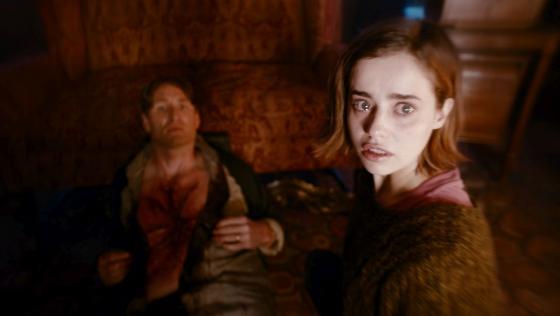
Everygamegoing
 8th October 2022
8th October 2022
Categories: Review: Software
Author: Dave E
Publisher: Limited Run Games
Machine: PlayStation 4 (US Version)
Erica
Erica is another 'branching movie'-style game, and it's in the same mould as the rather successful Hidden Agenda, which I've also played. You take the role of the titular Erica and can play using either your Smartphone device or with the regular PS4 controller. The version I played through was the Limited Run Games physical release, which currently costs $39.99.
Erica is a young woman. I'm not sure exactly how old she is but perhaps no more than eighteen. She lives in a ground floor apartment that doesn't have a lot of natural light, and, before we catch up to her in the present day, we are shown a quick prologue in which she, as a younger child, discovered her father dead, bloodied and with some very intricate circular symbol carved across his stomach. It's all rather thrilling and, although there's not a great deal of interaction between the player and the unfolding scene, there's some interesting dynamics as you use your smartphone to flip the needle on an old-style gramophone, spark a cigarette lighter and turn numerous dials and buttons.
Anyway, the flame-licked gore doesn't end with the murder of your father. Oh no, when you start the game proper, a mysterious package arrives - complete with bloodstained exterior (and a 'Fragile' label?) - and opening it up, you find a bloodied, severed arm, clutching a medallion. The symbol on that medallion looks a lot like the one carved on your father's chest too.

What on earth is going on?
Well, you might ask!
Erica's plot is completely ridiculous. Even just a few minutes into playing this game, you start to question exactly what is real and what is not. No matter what options you choose - and there are a lot of them - and what branches the story flows down as a result of these choices, there's very little of the plot that makes any sense. Playing Erica is a lot like watching one of those (totally forgettable) late-night B-movies and, whilst it moves along at a fair old pace, your brain keeps interjecting that what you're watching now doesn't seem to chime with what you watched ten minutes ago. And worse, the game has a tendency to dwell on things which may or may not be relevant in equal measure. To give just one example, if you choose to examine yourself in a mirror, you'll find Erica is sporting a fairly large bruise in the middle of her stomach. The origin of the bruise is never explained, no matter what branch of the story you follow.

However, before I get too ahead of myself, let's return to that severed hand. Perhaps it was delivered to Erica by that furtive black woman that lives in the apartment opposite? The package doesn't seem to have a postage stamp (suggesting it was delivered by hand) and the game doesn't let you avoid seeing this suspect. So it's more than a bit surprising that, when the police show up to take a look at the hand, Erica doesn't mention that she saw this black woman. Instead, you get to doodle in a small notepad whilst the investigating officer tells you that the hand belonged to an employee of a place called Delphi House and he has "reason to believe" that the same person who murdered this employee might also have murdered your father all those years ago (because your father established the Delphi House institution). And so, he proposes, for your own safety, you should be relocated to Delphi House as he, the detective, will be "running the operation from there".
How in God's name this makes any sort of sense is just completely glossed over. Firstly, I've never heard of a police detective running a murder investigation from a mental institution before. And, secondly, we should remember Erica has just opened a hand-delivered package containing a severed human hand and is now being told by the police that they intend to take her to the very place where the former owner of this hand had it separated from his body! And she's just like yeah, ok, that's sounds perfectly safe, logical and reasonable. And this is by no means the only time Erica seems to want the player to suspend his disbelief. Like I said, every ten minutes or so, the game veers flails from scene to scene with characters behaving without any regard for what just occurred. In fact, it's all so random that it all feels dreamlike. Perhaps the only thing that actually happened was the very first scene - the one where the young Erica sat down with her father and listened to some music and the entire game is just some weird dream a la the very stylish movie Mulholland Drive.
But, whilst there's certainly an argument for this, there's also hundreds of competing theories. When the plot gets going, Erica is moved to the institution and she is treated in the exact same manner as the other residents there, who are all young women of roughly her age who are all displaying challenging behaviour. Inside the confines of this institution, it all feels less Mulholland Drive and more Shutter Island: the young girls in residence narrating stories of satanic rituals, future forecasting and petals and perfumes that bring secret powers to the fore are roughly counter-balanced by those in charge (almost all of them men) telling Erica that she's not well and she needs professional help. Depending on exactly how the story branches, the detective can begin to suspect Erica herself is the murderer, and that the black woman she claims to have seen is a figment of her imagination. Which, actually, doesn't seem so much of a stretch in that this black woman only seems to ever put in an appearance when Erica is alone.

However, convince yourself of this and you're be quickly disabused by the fact that - spoiler alert - it isn't too long before another member of the faculty is unceremoniously offed and, on this occasion is skinned, has his skin wrapped around one of Erica's dolls, and the doll is posted to Erica at the institution. Now I could make hundreds of points about how completely ridiculous this is but let me just stick to the obvious. Recall that Erica was relocated to the institution was because someone sent her a severed body part. Well, she has now received another severed body part at the institution. So that great plan to spare her from more severed body parts hasn't worked, has it?! Aha, but perhaps Erica really is mad, and is murdering people and sending their body parts to herself (although what motive she has for doing that is unclear), then forgetting all about it. Um, yes, but if he's mad, and those in charge of her know that she is mad, then why do they keep leaving her completely alone?
Games like Erica take a lot of thought, and I can't see how anyone putting something like Erica together didn't just call a halt to the project by observing that, no matter how you figure it, the two words you're left with to describe the plot are: Stupid and Absurd. To make sure I hadn't just been unlucky, I forced myself to play it twice. The first time I feel I played through it with logic, the second time I just chose the options I believed would give me the most drama. I have to admit that I received a wildly different story arc, with completely different scenes, on each of these playthroughs. Erica is clearly much more 'divergent' than Hidden Agenda, which I think is its nearest neighbour. There only seems to be five or so 'key scenes' that always play out in the same order.
What's also very different to Hidden Agenda however, and something that I haven't mentioned so far, is that Erica is Full Motion Video (FMV). Clearly, technology is on the cusp of character-models being indistinguishable from actors and actresses (Witness the Abba arena in Central London, for example), but the majority of decision-making game releases have chosen to build character models of the actors and actresses in question. In games like The Quarry, you are still moving a character, a collection of high resolution pixels and, even in cut-scenes, you're watching a character, not a real actor. In Erica, this isn't the case. The scenes have been individually filmed, but the actors behave like computer characters and each scene has been tweaked to appear more 'computer game like'. The result is actually very impressive, so impressive in fact that it took me at least twenty minutes to work out that that is what had been done. As a result, Erica is like a more sophisticated version of the Netflix Black Mirror: Bandersnatch movie. I can imagine it will appeal to those players who don't have time for regular games, because it is genuinely a real movie. Each scene is very well framed, the smartphone controls are very intuitive indeed and it's fast-paced enough for a single playthough to take only about ninety minutes.
So, is it any good? Well, yes and no. It's entertaining enough and it genuinely does have replay value. As it's more movie than game, I suppose I should also judge it more by the elements that make a good movie so, bearing that in mind, the acting is good, the musical score is unobtrusive, it's tense, it's thrilling and, even though it's confusing, it never confused me enough that I thought about turning it off. The movie it most put me in mind of was Never Talk To Strangers, a little-known thriller movie starring Rebecca DeMornay and Antonio Banderas, a movie which keeps you guessing as to the mental health of each of its central characters until its final, quite satisfying, denouement. In Erica, you won't be surprised to learn, that denouement never happens. It can never happen, because the threads just cannot tie together in a way that will satisfy the player. But if you're the type of person that can appreciate the pace of a movie, rather than whether it ultimately delivers on its promise, then you'll probably enjoy Erica. I think it takes us one step closer to something that really will be ground-breaking rather than being ground-breaking itself.
Other Reviews Of Erica For The PlayStation 4 (US Version)
Erica (Limited Run Games)
Mambo Number Five
Erica (Limited Run Games)
A review by A.J. Maciejewski (Video Chums)
Erica (Limited Run Games)
A review by Eric Hauter (Gaming Nexus)
Scores
PlayStation 4 Version| Atmosphere | 85% |
| Presentation | 93% |
| Controls | 88% |
| Plot | 24% |
| Overall | 73% |



















